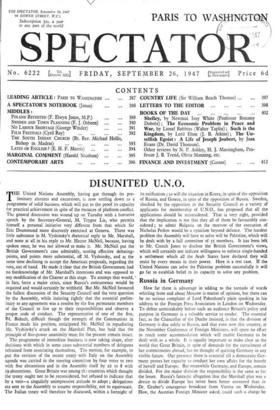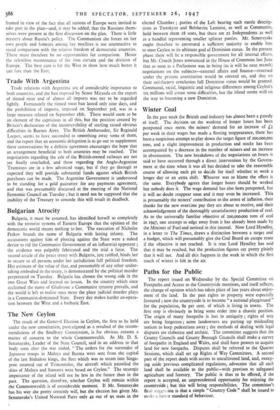Russia in Germany
How far there is advantage in adding to the tornado of words whirling from and about Moscow is matter of opinion, but there can be no serious complaint of Lord Pakenham's plain speaking in his address to the Foreign Press Association in London on Wednesday. To define unmistakably before such an audience Britain's policy and purpose in Germany is a valuable service to render. The essential fact, as the Chancellor of the Duchy insisted, is that the division of Germany is due solely to Russia, and that even now this country, at the November Conference of Foreign Ministers, will spare no effort to reach some accommodation which will enable Germany to be dealt with as a whole. It is equally important to make clear to the world that Great Britain, in spite of demands for the curtailment of her commitments abroad, has no thought of quitting Germany in any visible future. Our presence there is essential till a democratic Ger- many proves her capacity to conduct her own affairs for the benefit of herself and Europe. But meanwhile Germany, and Europe, remain divided. For the major division the responsibility is the same as for the lesser. Russia's fantastic allegation that the Marshall plan was a device to divide Europe has never been better answered than in Dr. Gruber's courageous broadcast from Vienna on Wednesday. How, the Austrian Foreign Minister asked, could such a charge be framed in view of the fact that all nations of Europe were invited to take part in the plan—and, it may be added, that the Russians them- selves were present at the first discussion on the plan. There is little mystery about Russia's policy. The Communism she forces on her own people and foments among her satellites is too unattractive to stand comparison with the relative freedom of democratic countries. There must therefore be no opportunities for comparison. Hence the relentless maintenance of the iron curtain and the division of Europe. The best cure is for the West to show how much better it can fare than the East.



































